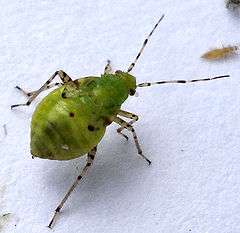Liocoris tripustulatus
Liocoris tripustulatus or the common nettle bug is a species of plant bug belonging to the family Miridae, subfamily Mirinae. The species was first described by Johan Christian Fabricius in 1781.[1][2]
| Liocoris tripustulatus | |
|---|---|
| Adult | |
| Scientific classification | |
| Kingdom: | |
| Phylum: | |
| Class: | |
| Order: | |
| Family: | |
| Genus: | |
| Species: | L. tripustulatus |
| Binomial name | |
| Liocoris tripustulatus (Fabricius, 1781) | |
| Synonyms | |
|
List
| |
Habitat
These plant bugs are generally found on low vegetation.[7]
Description

Adults are normally 4 to 5 mm long, darker brown with cream-coloured to yellow highlights. The scutellum shows a heart shaped marking, while in the wings there are two spots. Across the body is present a more or less visible clear band. This species is quite variable in colour. In springs the basic colour is darker, while the cuneus is bright orange-yellow. The new generation of adults is commonly paler and markings are less pronounced. Head width is about 1/2 of the width of the pronotum. Legs are pale yellowish, striped with black rings. Tibiae show short dark spines.[8][9]
Biology
Adults can be found all year. Following mating, females may survive until mid-summer, when the adults of the new generation appear.[8] The primary food of these bugs in all stages of development is nettles.[8]
Bibliography
- Hudec K., Kolibáč J., Laštůvka Z., Peňáz M. a kol. (2007): Příroda České republiky: průvodce faunou, Academia
- Kerzhner I. M.; Josifov M. (1999). "Family Miridae". In Aukema, Berend; Rieger, Christian. Catalogue of the Heteroptera of the Palaearctic Region. 3, Cimicomorpha II. Amsterdam: Netherlands Entomological Society. pp. 1–577, pages 108 & 109. ISBN 978-90-71912-19-1.
- Kment P. (2013) - Preliminary check-list of the Heteroptera of Czech Republic
- Schwartz, Michael D. & Foottit, Robert G. (1998). Revision of the Nearctic species of the genus Lygus Hahn, with a review of the Palearctic species (Heteroptera: Miridae). Memoirs of Entomology International number 10. Gainesville, Florida: Associated Publishers. ISBN 978-1-56665-066-3.
References
- BioLib
- NCBI
- Kerzhner I. M.; Josifov M. (1999). "Family Miridae". In Aukema, Berend; Rieger, Christian (eds.). Catalogue of the Heteroptera of the Palaearctic Region. 3, Cimicomorpha II. Amsterdam: Netherlands Entomological Society. pp. 1–577, pages 108 &, 109. ISBN 978-90-71912-19-1.
- Schwartz, Michael D. & Foottit, Robert G. (1998). Revision of the Nearctic species of the genus Lygus Hahn, with a review of the Palearctic species (Heteroptera: Miridae). Memoirs of Entomology International number 10. Gainesville, Florida: Associated Publishers. ISBN 978-1-56665-066-3.
- Fauna Europaea
- GBIF
- Eakringbirds
- British Bugs
- UK Wildlife
External links
| Wikispecies has information related to Liocoris tripustulatus |
| Wikimedia Commons has media related to Liocoris tripustulatus. |